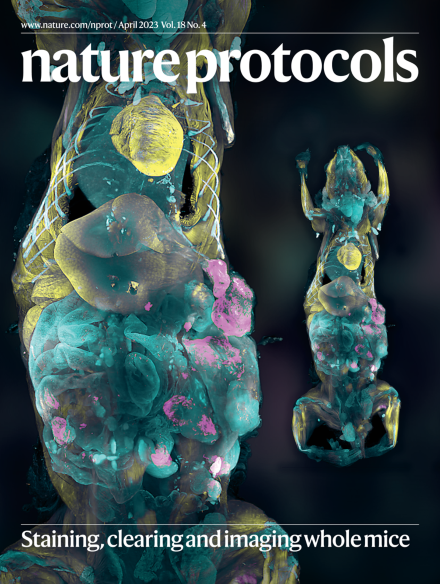Open-vessel polymerization of N-carboxyanhydride (NCA) for polypeptide synthesis
IF 13.1
1区 生物学
Q1 BIOCHEMICAL RESEARCH METHODS
引用次数: 0
Abstract
Synthetic polypeptides, also known as poly(α-amino acids), have the same polyamide backbone structures as natural proteins and peptides. As an important class of biomaterials, polypeptides have been widely used because of their biocompatibility, bioactivity and biodegradability. Ring-opening polymerization of N-carboxyanhydride (NCA) is a classical and widely used method for the synthesis of polypeptides. The dominantly used primary amine–initiated NCA polymerization can yield well-defined polymers and complex macromolecular architectures, but the reaction is slow and sensitive to moisture, making it necessary to use anhydrous solvents and a glovebox. One solution is to use lithium hexamethyldisilazide (LiHMDS) as the initiator, as described in this protocol. LiHMDS-initiated NCA polymerization is less sensitive to moisture and can be carried out in an open vessel outside the glovebox. It is also very fast; the reaction can be complete within 5 min to produce 30-mer polypeptides. In this protocol, poly(γ-benzyl-l-glutamate) is prepared as an example, but the protocol can easily be adapted to the synthesis of other polypeptides by generating NCAs from different amino acids, making it particularly suitable for the efficient parallel synthesis of polypeptide libraries. We provide detailed procedures for NCA synthesis and purification, the method of polymer end-group modification and measurement of polymerization kinetics and reactivity ratio. The procedure for synthesis of monomers and polymerization to form polypeptides requires <1 d. The superfast and open-vessel NCA polymerization method described here will probably enable a wide range of applications in the synthesis and functional study of polypeptide biomaterials. Synthetic polypeptides are used in many applications in which biocompatibility is important. This protocol describes a fast lithium hexamethyldisilazide-initiated N-carboxyanhydride ring-opening polymerization method for their synthesis.

用于多肽合成的 N-羧基酸酐(NCA)开孔聚合。
合成多肽又称聚(α-氨基酸),与天然蛋白质和肽具有相同的聚酰胺骨架结构。作为一类重要的生物材料,多肽因其生物相容性、生物活性和生物可降解性而得到广泛应用。N- 羧基酸酐(NCA)开环聚合法是合成多肽的一种经典且广泛使用的方法。主要使用的伯胺引发的 NCA 聚合反应可以产生定义明确的聚合物和复杂的大分子结构,但反应速度缓慢,对水分敏感,因此必须使用无水溶剂和手套箱。一种解决方案是使用六甲基二硅氮化锂(LiHMDS)作为引发剂,如本方案所述。LiHMDS 引发的 NCA 聚合对湿气的敏感性较低,可以在手套箱外的开放式容器中进行。而且反应速度非常快,5 分钟内即可完成反应,生成 30 个聚合物的多肽。在本方案中,以制备聚(γ-苄基-L-谷氨酸)为例,但该方案可以很容易地通过从不同氨基酸生成 NCA 来合成其他多肽,因此特别适用于多肽库的高效平行合成。我们提供了 NCA 合成和纯化的详细步骤、聚合物端基修饰方法以及聚合动力学和反应率的测量方法。合成单体和聚合形成多肽的程序要求
本文章由计算机程序翻译,如有差异,请以英文原文为准。
求助全文
约1分钟内获得全文
求助全文
来源期刊

Nature Protocols
生物-生化研究方法
CiteScore
29.10
自引率
0.70%
发文量
128
审稿时长
4 months
期刊介绍:
Nature Protocols focuses on publishing protocols used to address significant biological and biomedical science research questions, including methods grounded in physics and chemistry with practical applications to biological problems. The journal caters to a primary audience of research scientists and, as such, exclusively publishes protocols with research applications. Protocols primarily aimed at influencing patient management and treatment decisions are not featured.
The specific techniques covered encompass a wide range, including but not limited to: Biochemistry, Cell biology, Cell culture, Chemical modification, Computational biology, Developmental biology, Epigenomics, Genetic analysis, Genetic modification, Genomics, Imaging, Immunology, Isolation, purification, and separation, Lipidomics, Metabolomics, Microbiology, Model organisms, Nanotechnology, Neuroscience, Nucleic-acid-based molecular biology, Pharmacology, Plant biology, Protein analysis, Proteomics, Spectroscopy, Structural biology, Synthetic chemistry, Tissue culture, Toxicology, and Virology.
文献相关原料
公司名称
产品信息
阿拉丁
Sodium
 求助内容:
求助内容: 应助结果提醒方式:
应助结果提醒方式:


